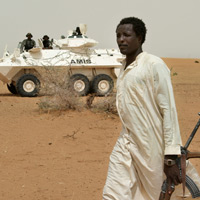
Less than a week after Chad and Sudan inked a formal agreement to set aside their differences this past May, the Sudanese government gave Chadian rebels the green light to launch a cross-border attack from their rear bases inside Darfur. Having repelled Sudan-backed rebel offensives that reached the capital N’Djamena in 2006 and 2008, the Chadian military was well prepared. Chadian forces routed the rebels near the border, chased them back into Sudan, and launched cross-border airstrikes against those who tried to regroup.
Lost in the Sahel
Toward a diplomatic strategy for Chad
Prioritize political reform
Conclusion: an integrated, regional approach

